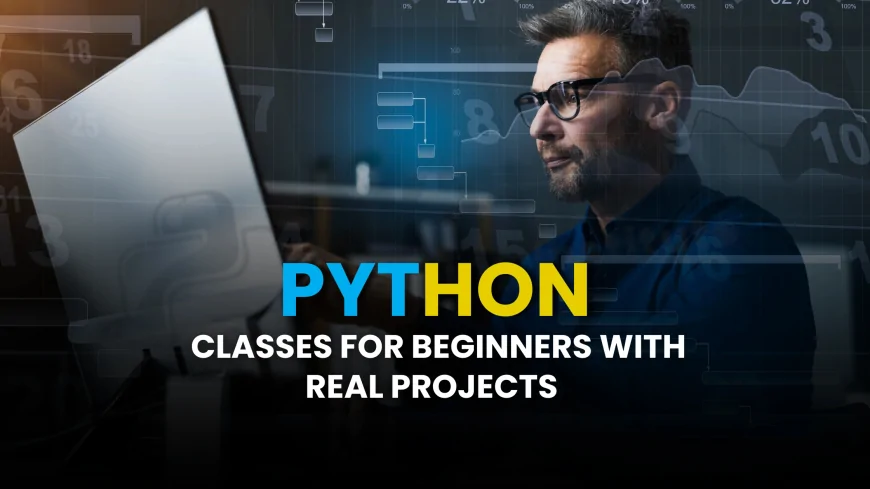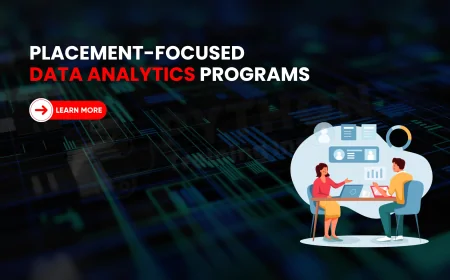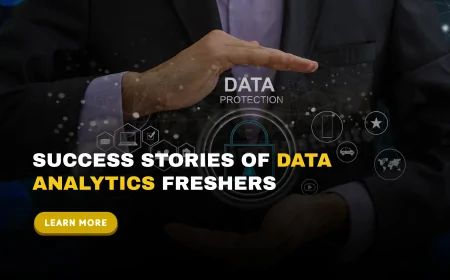Python Classes for Beginners with Real Projects Pune | Project-Based Python Classes for Beginners Pune
Enroll in Python classes for beginners in Pune with real projects. Learn to build apps, automation tools, and GUIs from scratch with expert guidance, hands-on practice, and certification from top training institutes like WebAsha.

Table of Contents
- 1. Why Choose Project-Based Python Classes?
- 2. Who Are These Classes For?
- 3. Curriculum & Sample Projects
- 4. Class Formats & Schedules
- 5. Top Class Providers in Pune
- 6. Tools & Technology Stack
- 7. Mentorship & Support
- 8. Benefits of Real Projects
- 9. Frequently Asked Questions (20)
- 10. Conclusion
Why Choose Project-Based Python Classes?
Project-based learning is one of the most effective approaches to mastering programming, especially for beginners. Rather than memorizing syntax or following theory-heavy sessions, learners apply concepts to build functional, real-world applications. Here's why this method stands out:
- Hands-On Experience: Projects turn abstract concepts into tangible skills by helping you write, debug, and run code in real scenarios.
- Confidence Booster: Watching your code come to life in the form of apps, tools, or automation scripts builds self-belief and momentum.
- Portfolio Building: A solid collection of real Python projects (like a to-do app, chatbot, or GUI tool) enhances your resume and job prospects.
- Faster Retention: Learning by doing improves memory retention, problem-solving skills, and understanding of Python’s core principles.
- Real-World Relevance: Project-based courses simulate actual programming tasks performed in tech jobs, preparing you for the workplace from day one.
Choosing a Python class that focuses on real projects ensures that you're not just learning code—you’re learning how to solve problems, build applications, and become job-ready. Whether your goal is employment, freelancing, or entrepreneurship, this method offers practical and lasting results.
Who Are These Classes For?
- Complete beginners with no coding background
- Students seeking practical coding exposure
- Working professionals looking to upskill
- Career changers stepping into tech
- Hobbyists wanting to build useful tools
Curriculum & Sample Projects
A typical beginner-friendly course in Pune covers:
- Python basics: Variables, loops, data types, functions, modules
- File I/O & automation: CSV manipulation, reading/writing files
- GUI development: Desktop tools with Tkinter or PyQt
- Web basics: Simple Flask apps and routing
- Data projects: Scripts to parse Excel/CSV and visualize data
- Deployment: Hosting Flask apps on Heroku or similar
Projects include: Todo web app, desktop expense tracker, automated email scripts, data analysis dashboard, mini-portfolio websites, and chatbot scripts.
Class Formats & Schedules
- Weekend batches: Ideal for students and working professionals
- Evening weekday classes: Flexible and easy to fit around work
- Full-time bootcamps: Two-week/day intensive programs
- Self-paced with live support: Ideal for independent learners
- Hybrid models: Blended of live sessions and recorded content
Top Class Providers in Pune
WebAsha Technologies Pune is the premier institute in WebAsha offering comprehensive, placement-driven Python training suitable for developers, data engineers, and automation professionals.
What Sets WebAsha Apart:
- Beginner to Advanced Curriculum: Covers core Python, OOP, web frameworks (Flask, Django), REST APIs, data handling, multithreading, GUI development, and more.
- Live Projects & Case Studies: Practical experience through real applications like Flask-based web apps, desktop tools with Tkinter, networking scripts, etc.
- Small, Interactive Batches: Personalized attention, live instructor-led sessions, and flexible scheduling.
- Capstone & Placement Support: Includes capstone projects, mock interviews, resume prep, and certification—plus a robust placement cell that organized 1,000+ interviews and placed 1,500+ students in the past year.
- Certification & Exam Center: Frequent certification exams (70% passing mark), globally recognized credentials, and free retake options.
- Hands-On Tools & Resources: Training includes Docker, Heroku/AWS deployment, Git workflows, and a modern LMS.
Tools & Technology Stack
- Python 3.x, pip, virtual environments
- Flask, Tkinter or PyQt for GUI
- SQLite or CSV files for storage
- VS Code or PyCharm IDE
- Git & GitHub for version control
- Heroku/AWS for deploying Flask apps
- Pandas/Matplotlib for basic data handling and plotting
- Postman for API testing
Mentorship & Support
- Live Q&A & code review sessions
- Dedicated Slack/Discord groups for discussion
- Peer review for collaborative learning
- Access to session recordings for revision
- Structured guidance throughout the course
Benefits of Real Projects
- Portfolio-ready apps: Shareable and practical
- Employment edge: Projects demonstrate your skills
- Confidence: In building from concept to deployment
- Concept reinforcement: Real work improves understanding
- Career clarity: Helps in choosing your tech path
Frequently Asked Questions (FAQs)
1. Do I need prior coding experience?
No—the courses start from scratch and guide you step by step.
2. How long are the classes?
Typically 4–8 weeks depending on the schedule format.
3. What projects will I build?
You’ll build practical tools like a to-do app, expense tracker, web server, and basic chatbot.
4. Are classes conducted on weekends?
Yes. Weekend batches are common and designed for working learners.
5. Will I learn version control?
Yes—you’ll learn basic Git and GitHub commands as part of course workflow.
6. Do I get support after the class ends?
Some providers offer follow-up mentoring or community access post-course.
7. Will I deploy my project?
Yes—deploying a Flask app is included, usually via Heroku.
8. Is peer collaboration included?
Yes—some classes include collaborative assignments and pair programming.
9. Can I choose my project?
Depending on the provider, you may suggest a project and build it with mentor approval.
10. Do I get certificates?
Yes—most courses provide a certificate of completion.
11. Is data analysis covered?
Yes—basic Pandas scripting and plotting projects are included.
12. What skill level will I reach?
You’ll graduate as a confident beginner capable of building and deploying apps.
13. Can I continue learning afterward?
Absolutely—you’ll have the skills to proceed to web, automation, or data science courses.
14. Are these classes online?
Most are online with live video sessions and recordings.
15. How many students per batch?
Small batches (10–20 students) are common for personalized attention.
16. What is the cost?
Fees range between ₹5,000–₹15,000 depending on duration and provider.
17. Do I need to buy software?
No—all required tools are free and open-source.
18. Are these courses beginner-friendly?
Yes—designed specifically for absolute beginners.
19. Will I learn debugging?
Yes—basic debugging techniques are taught through real code review.
20. How do I enroll?
Register via provider websites, attend demo sessions, and enroll in suitable batches.
Conclusion
Python classes in Pune that focus on real-world projects for beginners deliver not only learning but tangible results. Through guided mentorship, curated projects, and flexible schedules, these programs provide a clear path from zero knowledge to functional, deployable apps. Whether you're a student, professional, or hobbyist, investing in such a project-based course is a smart step toward becoming a competent developer. Start with a beginner class today and build your future, one project at a time!
What's Your Reaction?
 Like
0
Like
0
 Dislike
0
Dislike
0
 Love
0
Love
0
 Funny
0
Funny
0
 Angry
0
Angry
0
 Sad
0
Sad
0
 Wow
0
Wow
0















